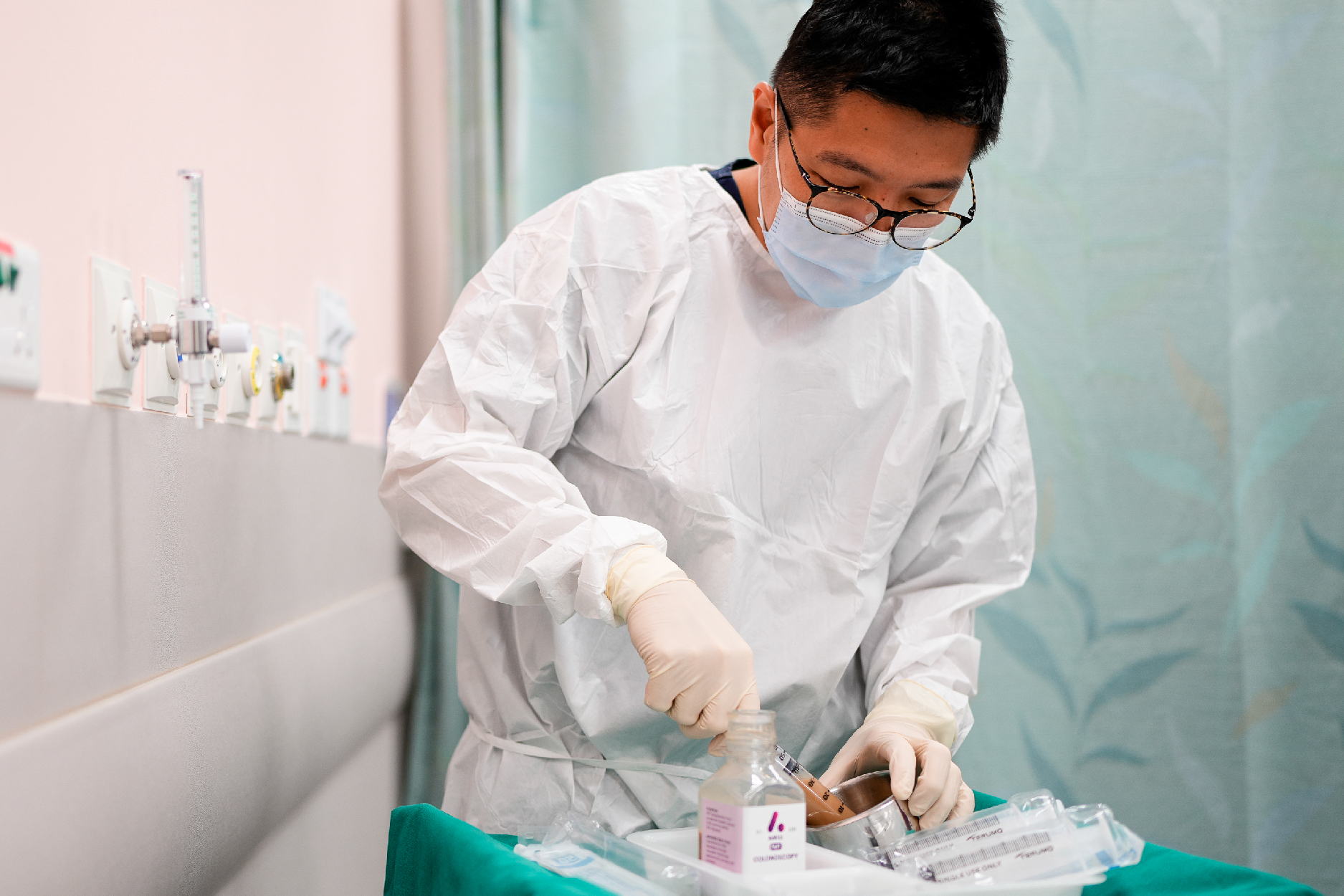Southeast Asia’s sole stool bank taps into the potential of gut microbiome to treat a myriad of conditions,
from inflammatory bowel disease to irritable bowel syndrome to Clostridioides difficile infections.
Issue 6 | September 2024

 Subscribe and ensure you don't miss the next issue!
Subscribe and ensure you don't miss the next issue!
Tucked away in the Singapore Science Park, a hub for research, development and technology in Queenstown, lies a rather unconventional ‘bank’. Here, you won’t find gold or money secured behind vaults, but rather something unusual.
Operated by a local start-up, this bank stores stool samples, from which gut microbiome is harvested for faecal microbiota transplantation (FMT). The sole stook bank in Southeast Asia, of which Dr Jonathan Lee Wei Jie, Senior Consultant, Division of Gastroenterology and Hepatology, Department of Medicine, National University Hospital (NUH) is a co-founder, has pioneered FMT in Singapore. By introducing healthy gut bacteria into patients, this technique has shown immense potential in managing and treating a variety of conditions, such as Clostridioides difficile (C. diff) infections and inflammatory bowel disease.
One person’s poop, another’s life-saving potion
The gut microbiome is a diverse ecosystem of microorganisms, spanning fungi, bacteria and viruses, that reside within the gastrointestinal tract. Whether extracting energy from what we eat or creating crucial compounds such as neurotransmitters, enzymes and vitamins, these microscopic critters play a key role in regulating many physiological processes, from blood sugar regulation to immune system support and even mood modulation.
Maintaining a healthy, balanced gut microbiome is vital for overall well-being. Disturbances in this microbial community can often lead to a host of health issues, ranging from gastrointestinal disorders and obesity to impacts on mental health.
“This is where FMT steps in to mitigate disease,” says Dr Lee. “Currently, FMT is primarily used to treat severe, recurrent C. diff infections — a condition characterised by watery, and sometimes bloody, diarrhoea, severe dehydration, fever and nausea.”
This condition, which can be life-threatening, often arises after a course of strong, broad-spectrum antibiotics, which indiscriminately kill most gut bacteria, leaving only the most resistant strains behind. These surviving bacteria can wreak havoc on the patient’s microbiome, bringing about serious infections.
“By injecting healthy gut microbiota into a patient affected by C. diff infections via endoscopy, a 15-minute process, we’ve seen remarkable success in treating the disease,” says Dr Lee. “Last year, 19 out of 20 patients who received this therapy experienced no recurrence of C. diff infection after a single microbiota infusion, with only one requiring a second infusion ten months later.”
Promising poop potential
For FMT to be effective, stringent protocols govern the collection and processing of gut microbiota to ensure the final liquid remains potent. For instance, careful attention must be paid to the rewarming process to prevent oxidation, which could reduce the treatment’s effectiveness.
Dr Lee emphasises the importance of a reliable source of healthy gut microbiota, which hinges entirely on stool donations from volunteers. “Only the healthiest individuals meet the strict criteria, with fewer than two out of 100 donors qualifying,” he notes.
The gut microbiota has, in recent years, been thrust into the scientific limelight, with researchers probing its potential in developing biomarkers for various neurological disorders such as autism, depression and Alzheimer’s disease, as well as metabolic conditions such as diabetes and fatty liver disease.
In Singapore, Dr Lee is leading two clinical trials at NUH, one of which focuses on treating irritable bowel syndrome (IBS), a chronic condition that causes unpleasant abdominal symptoms, including constipation, diarrhoea, gas and bloating. This year, 110 patients will take part in Singapore’s first clinical trial using locally sourced faecal microbiota, fashioned into pills, for IBS treatment.
The second trial targets inflammatory bowel disease (IBD), another chronic condition that triggers painful flare-ups in the gastrointestinal tract. This trial explores the incorporation of FMT into existing therapies, with preliminary results showing improvement in four out of six participants. “As IBD cases rise in Singapore, with NUH’s patient numbers doubling over the past five years, exploring this promising treatment modality is particularly timely,” adds Dr Lee.
These investigations will be part of NUH’s new
National University Centre for Digestive Health (NUCD), which will spearhead efforts in research, clinical practices and the development of new technologies to enhance the early detection, diagnosis, treatment and prevention of gastrointestinal-related diseases.
_____________________________________________________________________________________________________________________________
Like this article? Simply subscribe to make sure you don't miss the next issue of EnvisioningHealth!


















